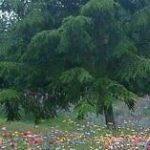A Water from the Well blog post, Parashat Shabbat Pesach
Written by Rabba Kaya Stern-Kaufman
20210403
 In the burst of springtime, Shabbat Pesach arrives as an oasis of beauty and love. It is the one day in our year in which the Rabbis established the practice of publicly reading the book Shir Hashirim/The Song of Songs. As we look at the text, we will discover that ‘The Song,’ like Passover itself, is burgeoning with environmental themes and delivers a message of how we might “get back to the garden.”
In the burst of springtime, Shabbat Pesach arrives as an oasis of beauty and love. It is the one day in our year in which the Rabbis established the practice of publicly reading the book Shir Hashirim/The Song of Songs. As we look at the text, we will discover that ‘The Song,’ like Passover itself, is burgeoning with environmental themes and delivers a message of how we might “get back to the garden.”
Shir Hashirim is a passionate love song between two lovers who express their adoration for one another through images of nature. The beauty of the natural world, its scents, colors, sounds and textures are the palette of this poem. These verses below are taken from throughout her seven chapters. They are just a smattering of the abundant images that course through the Song like a brook winding its way through grassy fields. Notice the use of nature images to describe the lovers.
Your name is like finest oil; My beloved to me is like a bag of myrrh lodged between my breasts; You are fair with your dove-like eyes; My beloved to me is a spray of henna blooms; I am a rose of Sharon, a lilly of the valley;
Your teeth are like a flock of ewes; Your brow gleams like a pomegranate split open; Your breasts are like two fawns; Your limbs are like an orchard of pomegranates and of all luscious fruits of henna and of nard, fragrant reed and cinnamon with all aromatic woods;You are a garden spring, a well of fresh water…
Shir Hashirim/The Song of Songs is not limited to describing female beauty. It resounds with passages that describe the beauty of the male form as well. And with a consistent voice, images of the natural world paint his picture:
Like an apple tree among trees of the forest, is my beloved;
My beloved is like a gazelle; His locks are curled and black as a raven;
His eyes are like doves, cheeks like beds of spices;
His lips are like lilies, they drip flowing myrrh; His hands are rods of gold studded with beryl, His belly a tablet of ivory adorned with saphires;
His legs, like marble pillars, he is majestic as Lebanon; stately as the cedars.
Unlike the image in Genesis of man and woman cast out of the garden with a mission to have dominion over the earth, Shir Hashirim plants the lovers back in a garden whose language is love. Rabbi Ellen Bernstein, author of The Promise of The Land haggadah (which we all received for this Pesach) and Jewish eco-theologian, writes about the relationship between Shir Hashirim and the environmental movement.
“While the lovers in the Song are keepers of the sheep and the gardens, there is no sense of dominion or hierarchy of humanity over nature, no objectification of nature. Neither anthropocentric or biocentric, the Song expresses a “natural intelligence.”… an intimacy and identification with nature, an intuitive knowing of nature born of the continuity between the body of flesh and the body of the earth. The boundary between human and nature is porous and the identity of lovers shifts back and forth from body to land to body.”
Rabbi Bernstein suggests that the consciousness expressed through the Song is one of wholeness. There is no clear separation between the lovers and the earth. They are one with the environment. Their loving relationship is expressed through their intrinsic adoration of the natural world. Recognition of the beauty of the earth becomes the vehicle for the expression of love. And in so doing, the people of the Song become the beloved and the earth becomes a garden.
Shir Hashirim opens a window into a world of possibility, a world of pure beauty and love. Rabbi Akiva once stated that “all of the scriptures are holy but Shir Hashirim as The Holy of Holies.” Now, what was the Holy of Holies? It was the place on earth, in the depths of the sacred Temple, in which a human being was able to have an intimate connection with the Divine. Shir Hashirim is described as the Holy of Holies because it paints a vision of a world in which Humanity and the Divine are in a state of intimate connection.
Shabbat Pesach is our day to dwell in this vision. It asks us to shift our own consciousness to that of the lovers in the garden; that we open our eyes to the beauty and Divine Presence that surrounds us at all times and that lives within each one of us. Today, let us make a new commitment to healing and maintaining that Garden. She is our most precious gift and our true Holy of Holies.